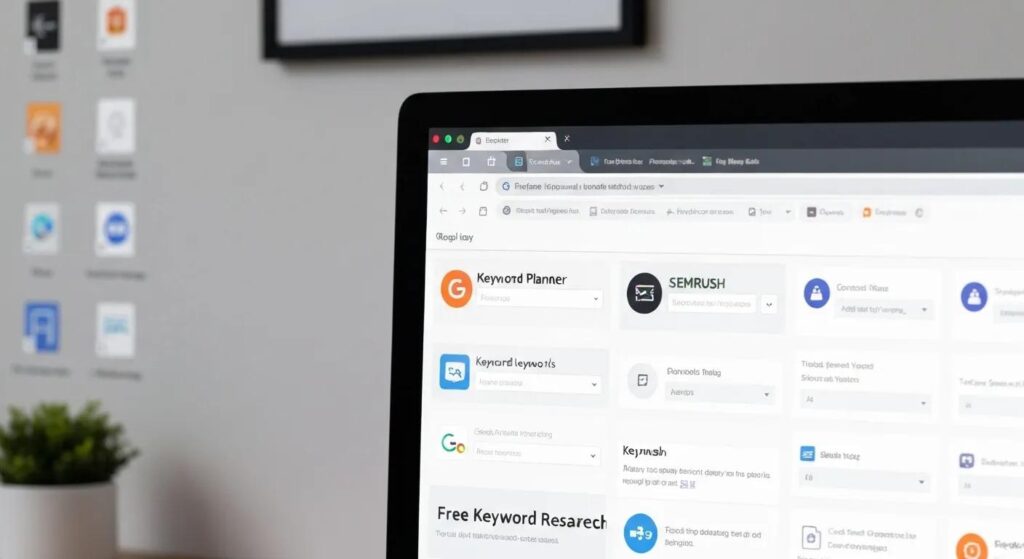Mastering SEO: Your Guide to Essential Keyword Research Tools
Every missed search opportunity is valuable traffic handed to your competitors. Keyword research tools are your key to unlocking those terms your audience is actively seeking. This guide will equip you with the knowledge to leverage both free and premium platforms, helping you pinpoint search volume, gauge competition, and align with user intent. Whether you’re a small business owner, an entrepreneur, or a nonprofit leader, you’ll discover how to elevate your organic visibility. We’ll start by defining keyword research and its vital metrics, then dive into top free options, explore robust paid solutions, and guide you in selecting the perfect combination for your unique goals. You’ll also gain insights into best practices, see how Astound Media integrates these tools for tangible growth, and find answers to your pressing questions, all designed to deliver actionable strategies from the very beginning.
“In the digital landscape, understanding what your audience is searching for is not just an advantage; it’s the bedrock of effective online presence. Keyword research tools are the compass that guides businesses toward those crucial connections, ensuring that every piece of content resonates with genuine user intent and drives meaningful engagement.” – Jorge Leger, Founder and Digital Marketing Consultant, Astound Media.
The Power of SEO in Marketing: What the Data Reveals
A comprehensive meta-analysis of ten studies from 2022-2024 confirms that implementing SEO, primarily through precise keyword optimization, dramatically boosts organic search rankings and website traffic. The research underscores content quality, strategic keyword use, and robust backlink profiles as critical drivers of SEO success.
This meta-analysis provides empirical validation for SEO’s effectiveness, particularly keyword optimization, directly reinforcing our core message about the indispensable role of keyword research tools in enhancing organic reach.
What Exactly Are Keyword Research Tools, and Why Are They Crucial for SEO?
Keyword research tools are sophisticated applications designed to collect and analyze search query data, serving as your compass for content strategy and attracting highly relevant traffic. Mastering these tools is fundamental to refining your on-page signals and ensuring your content resonates with what users are genuinely looking for.
What is Keyword Research, and How Does It Shape SEO Success?
Keyword research is the art and science of uncovering the precise terms and phrases your ideal audience uses when searching online. By strategically mapping these queries to your content topics, you ensure your pages directly address real user needs, leading to improved rankings and higher click-through rates. For instance, targeting local SEO strategies for small businesses rather than a generic “SEO advice” connects you with more engaged visitors, accelerating conversions and boosting revenue.
How Do Keyword Research Tools Help Uncover Search Volume and Keyword Difficulty?
These essential tools aggregate key metrics, such as average monthly searches (search volume) and the competitive landscape (keyword difficulty), to help you prioritize your efforts. Search volume indicates the potential reach of a keyword, while difficulty offers insight into how challenging it will be to rank on the first page. A balanced approach, combining high-volume, lower-difficulty terms with strategic long-tail variations, allows you to build a content roadmap that delivers both immediate wins and sustained authority.
Why is Understanding User Intent Paramount in Keyword Research?
User intent, whether a searcher is looking to learn, compare, or buy, is the driving force behind every query. Tools that categorize intent empower you to create content that perfectly matches searcher expectations, significantly reducing bounce rates and boosting engagement signals. For example, targeting “buy noise-cancelling headphones” with product pages directly addresses transactional intent, while “best noise-cancelling headphones reviews” is ideal for an informational blog post.
How Do Small Businesses and Non-Profits Benefit from Keyword Research Tools?
Organizations with limited marketing budgets often face the challenge of reaching diverse audiences effectively. Keyword research tools enable these groups to discover niche, less competitive queries tied to specific local markets or mission-driven objectives, maximizing the impact of every marketing dollar. By focusing on hyper-relevant search terms, you attract qualified traffic that is more likely to engage, convert, and support your goals, whether commercial or community-focused.
Keyword Selection in SEO: The Nuance of Relevance
This research explores the interplay between content relevance and website authority in influencing the effectiveness of keyword selection in SEO. It suggests that while content alignment is vital for organic clicks, the optimal keyword strategy, whether broad or specific, hinges on a website’s authority relative to its competitors, directly impacting organic rank and traffic flow.
This study offers a deeper perspective on how strategic keyword selection, coupled with content relevance and site authority, directly influences SEO outcomes, reinforcing the importance of a thoughtful approach to keyword usage.
Discover the Top Free Keyword Research Tools for Small Businesses and Entrepreneurs

Free keyword tools offer immediate, valuable insights without any initial financial outlay, making them perfect for startups and mission-driven organizations building their foundational data.
How Google Keyword Planner Powers Your SEO and PPC Efforts
Google Keyword Planner, a complimentary tool within the Google Ads platform, provides essential data on search volume ranges, competition levels, and suggested bid prices. By tapping into Google’s vast query database, it forecasts demand and identifies trending keywords, offering crucial intelligence for both organic content planning and paid campaign budgeting.
What Free Keyword Suggestions Does Ubersuggest Provide?
Ubersuggest’s free tier is a goldmine for generating keyword ideas, offering approximate search volume and SEO difficulty scores, and surfacing content suggestions based on competitor analysis. Its ability to scrape public data from search engine results pages highlights emerging queries, facilitating rapid topic discovery without requiring a paid subscription.
How AnswerThePublic Illuminates User Questions and Search Intent
AnswerThePublic transforms seed keywords into visual maps of questions, prepositions, and comparison queries. By analyzing Google’s autocomplete suggestions, it reveals the exact phrasing searchers use, empowering content creators to address specific user needs and journeys that might otherwise be missed by standard volume metrics.
What Are the Limitations of Free Keyword Research Tools?
While incredibly cost-effective, free tools often come with limitations. You might encounter less precise data (rounded volumes instead of exact figures), daily query restrictions, and a lack of advanced competitor analysis features. These constraints may necessitate supplementing with paid platforms or performing more frequent searches to maintain comprehensive and up-to-date keyword coverage.
Explore Leading Paid Keyword Research Tools for Advanced SEO Insights

Paid tools unlock deeper data, competitive benchmarks, backlink intelligence, and continuous tracking capabilities, essential for high-impact strategies. They are ideal for growing businesses ready to scale their content initiatives.
How Ahrefs Keyword Explorer Enhances Competitor and Backlink Analysis
Ahrefs Keyword Explorer uniquely combines search volume and difficulty data with proprietary clickstream insights, directly linking keywords to the pages that rank for them. It meticulously maps the backlinks pointing to top-ranking content, revealing valuable link-building opportunities. This dual focus on keyword and backlink intelligence equips you to create content that truly outperforms the competition.
What Makes Semrush’s Keyword Magic Tool So Effective for Comprehensive Research?
Semrush’s Keyword Magic Tool boasts a colossal database of over 20 billion keywords, meticulously organized by thematic clusters, intent filters, and SERP feature tags. Its standout advantage lies in its dynamic grouping of related terms, like all “transactional headphone” queries, making it incredibly efficient for discovering semantically connected phrases to build robust content clusters.
How Moz Keyword Explorer Aids in Keyword Difficulty and SERP Analysis
Moz Keyword Explorer utilizes a proprietary difficulty score, factoring in Domain Authority and page-level metrics, alongside an estimated organic click-through rate. This tool’s integrated approach, combining authority metrics with volume data, simplifies the process of identifying keywords that offer a strong balance of ranking potential and traffic generation, paving the way for an impact-driven content plan.
Why KWFinder Excels at Finding Long-Tail Keywords with Lower Competition
KWFinder specializes in uncovering long-tail keyword opportunities by analyzing question formats, location modifiers, and niche topics. Its strength lies in a focused dataset that highlights low-competition gems, making it an invaluable tool for emerging businesses aiming for quick wins in specialized market segments.
Comparing Pricing and Features Across Top Paid Keyword Research Tools
Your choice between plans will depend on your specific query volume needs, team size, and the depth of competitive intelligence you require.
How to Select the Ideal Keyword Research Tool for Your SEO Objectives
Aligning tool capabilities with your specific goals is key to maximizing resource efficiency and achieving impactful results.
Key Factors for Tool Selection: Budget, Business Scale, and SEO Ambitions
Your budget will naturally guide whether you begin with free platforms or invest in a comprehensive paid suite. The size of your company influences the number of user seats and query limits you’ll need. Your primary objectives, whether it’s dominating local SEO, achieving ambitious content volume targets, or identifying backlink gaps, will determine which feature sets are non-negotiable.
Maximizing Keyword Research Efficiency with a Hybrid Free and Paid Tool Approach
An effective hybrid workflow might start with tools like Google Keyword Planner or AnswerThePublic for initial idea generation, then transition to powerful platforms like Ahrefs or Semrush for in-depth competitor analysis and ongoing performance tracking. This balanced approach minimizes upfront costs while gradually introducing advanced insights as your strategy matures.
The Optimal Workflow for Resource-Limited Small Businesses and Non-Profits
For those operating with tight budgets, the best approach is to start with free tools to compile a robust list of 50–100 target keywords. Prioritize low-difficulty, long-tail keywords and create content in focused batches. As your initial content gains traction, reinvest the time saved into periodic audits using a single, well-chosen paid tool to refine your keyword list and stay ahead of emerging search trends.
Essential Best Practices for Conducting Effective Keyword Research
Mastering the properv methodology ensures every keyword you select strategically supports your broader content and business objectives.
Analyzing SERPs to Uncover Keyword Opportunities
Begin by performing a search for each target keyword and meticulously documenting the SERP features present, such as featured snippets, People Also Ask boxes, and video carousels. Mapping these features reveals crucial insights into user intent and the content formats that perform best. If video content consistently dominates the first page, it’s a clear signal to consider a multimedia approach.
The Importance of Monitoring Trends and Regularly Refreshing Keywords
Search behavior is dynamic; new events, emerging products, and shifts in user language can quickly render previously effective keywords obsolete. Scheduling quarterly reviews of search volume and intent ensures your content remains relevant to your audience’s evolving needs, helping you maintain or even improve your rankings.
Integrating User Intent and Long-Tail Keywords into Your SEO Strategy
Segment your keyword list by intent category, informational, commercial, or transactional, and design your content formats accordingly (e.g., comprehensive guides, detailed product pages, insightful comparison charts). Enrich each core topic with multiple long-tail variants to effectively capture niche questions and micro-moments in the user journey.
The Critical Role of Competitor Keyword Analysis in SEO Success
Analyzing your competitors’ top-ranking pages provides invaluable insights into content gaps and potential backlink sources you can target. By reverse-engineering the keyword sets and linking profiles of your most successful rivals, you can develop a data-driven roadmap to outperform them with superior content and strategic outreach.
How Astound Media Leverages Keyword Research Tools for Proven SEO Success
Astound Media employs cutting-edge platforms combined with proprietary methodologies to execute data-driven keyword strategies meticulously tailored for small businesses and non-profits.
The Expertise Astound Media Brings to Keyword Research and SEO Services
Our seasoned team combines extensive hands-on experience with the industry’s leading tools to conduct thorough search volume audits, precise difficulty assessments, and in-depth competitive analyses. We transform raw data into actionable content blueprints that perfectly align with your unique objectives and resource constraints.
How Astound Media Empowers Small Businesses and Non-Profits to Optimize Their Keyword Strategy
Astound Media’s distinctive approach begins with a deep dive into your mission and audience. We then apply insights from both free and paid tools to pinpoint low-competition, high-intent keywords. We construct a phased content roadmap, addressing immediate opportunities for quick wins and outlining pathways for future growth, designed to optimize your budget and amplify your impact.
Connect with Astound Media for Expert SEO Services and Consultation
Ready to explore personalized keyword research and expert SEO consulting? Contact us, and our dedicated team will arrange a comprehensive needs assessment and propose a tailored strategy that aligns perfectly with your goals and budget.
Frequently Asked Questions About Keyword Research Tools for SEO
Addressing these common queries will help you navigate tool selection and implementation with confidence and efficiency.
What’s the Top Free Keyword Research Tool for Small Businesses?
Google Keyword Planner is a standout for reliable volume ranges and competition insights. Ubersuggest excels at rapid idea generation, and AnswerThePublic uniquely visualizes user questions. Each offers essential foundational data without any cost.
How Do I Perform Keyword Research for SEO: A Step-by-Step Guide?
- Clearly define your core topics based on your business objectives.
- Utilize a free tool (like Google Keyword Planner) to generate an initial list of relevant terms.
- Filter your list based on search volume and keyword difficulty.
- Analyze SERP features and competitor pages to identify prime opportunities.
- Expand your list with long-tail variations using tools like Ubersuggest or KWFinder.
- Organize your keywords by user intent and map them to appropriate content types.
Following this structured workflow ensures comprehensive keyword coverage and strong alignment with user needs.
What Are the Three Primary Keyword Types and Their SEO Impact?
- Informational keywords fuel educational content and attract top-of-funnel traffic.
- Commercial keywords encourage comparison content and mid-funnel engagement.
- Transactional keywords target purchase-ready pages to maximize conversions.
Balancing these keyword types is essential for a well-rounded, full-funnel content strategy.
Is Google Keyword Planner Effective for SEO Beyond PPC?
Absolutely. While initially designed for ad campaign planning, its valuable search volume data and competition scores are instrumental for organic SEO teams seeking to understand demand patterns and identify emerging trends, making it a cornerstone of free keyword research.
Which Keyword Research Tool Offers the Highest Accuracy and Reliability?
Accuracy largely depends on data freshness and the size of the data sample. Premium platforms like Ahrefs and Semrush leverage extensive clickstream and partner datasets, providing more precise volume estimates and difficulty scores compared to free alternatives, making them the most reliable choice for advanced, data-driven strategies.
Elevate your SEO strategy by mastering keyword research: implement these powerful tools, adhere to best practices, and partner with experts to drive sustainable, measurable growth. Astound Media’s proven methodology ensures you select and effectively implement the right mix of platforms, transforming raw search data into compelling content that ranks, engages, and converts.
About the Author
Jorge Leger is the Founder of Astound Media, a New York-based digital agency specializing in strategic web design and marketing for organizational growth. As a Digital Strategist and Marketing Consultant, he brings over a decade of experience in WordPress, SEO, and automation. Jorge partners with mission-driven organizations, small businesses, and nonprofits to deliver measurable results in online presence and campaigns, with a particular expertise in helping these entities expand their reach. Connect with Jorge on LinkedIn.



